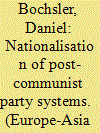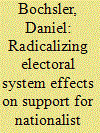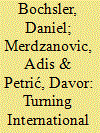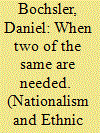|
|
|
Sort Order |
|
|
|
Items / Page
|
|
|
|
|
|
|
| Srl | Item |
| 1 |
ID:
096671


|
|
|
|
|
| Publication |
2010.
|
| Summary/Abstract |
Party nationalisation, defined as the homogeneity of party strength across a country, has recently become a major issue in research. Even though territory is a salient political question in the post-communist countries in Europe, party nationalisation in these countries has been neglected by the literature so far. This article presents data on party nationalisation for 20 countries over the period 1990-2007. It shows that the nationalisation of party systems in post-communist democracies is closely related to the territorial structure of social divisions, except for cases where the electoral systems provide for a high degree of nationalisation, or where super-presidentialism inhibits the creation of strong nationalised parties.
|
|
|
|
|
|
|
|
|
|
|
|
|
|
|
|
| 2 |
ID:
120356


|
|
|
|
|
| Publication |
2013.
|
| Summary/Abstract |
This paper investigates electoral outcomes produced by the two-round majority system in ethnically divided societies. Earlier studies, focused mainly on the Southern American states, have revealed that in ethnically mixed environments, competitors with radical positions on ethnic issues perform particularly well. This paper extends this idea to municipal elections in Serbia, showing how radical majority nationalist parties exhibit particularly strong performances in ethnically mixed municipalities. While this effect is also apparent under proportional representation, we argue that it is much stronger when a two-round majority vote system is employed.
|
|
|
|
|
|
|
|
|
|
|
|
|
|
|
|
| 3 |
ID:
174099


|
|
|
|
|
| Summary/Abstract |
International intervention is widely considered to stabilize peace in post-war societies. Its effects on democracy are more contested. External intervention risks reinforcing, rather than resolving deadlocks in domestic politics. This negative effect is not inevitable. This article proposes a new, theoretical model of political peacebuilding, based on a spatial model of politics in post-war democracies. In the classical model, the peacebuilding mission has an own political agenda, which relieves the domestic political actors of their political responsibility and deepens the domestic deadlock. In the arbiter model proposed in this article, the peacebuilding mission uses its powers to push for compromises between the domestic actors. This enables democratic decision-making within the domestic institutions. Empirically, the paper studies the impact of the Office of the High Representative (OHR) in Bosnia–Herzegovina with its power to issue binding decrees. The paper analyses the role of former High Representatives, using the authors’ original interviews with the office-holders and over 2700 press releases. As the results show, periods when the OHR acted as an arbiter were rewarded with a higher degree of cooperation between domestic elites. These findings corroborate the usefulness of the arbiter model as a new strategy of international intervention in post-conflict societies.
|
|
|
|
|
|
|
|
|
|
|
|
|
|
|
|
| 4 |
ID:
186864


|
|
|
|
|
| Summary/Abstract |
Lijphart’s claim that power-sharing spurs democratization in divided societies has strongly influenced ‘institutional engineering’ and is widely accepted among scholars despite the fact that empirical tests of its merits remain rare. This article revisits the democratic effect of power-sharing, arguing that it has two antagonist faces. On the positive side, it provides guarantees of inclusion to political elites, allowing them to commit to democratic rules. On the negative side, it also has an illiberal face, entailing limits on competition and individual rights. In this article, these contrary characteristics are traced back to two institutional types of power-sharing: a more flexible and open, liberal, type and a more rigid, corporate one. Using a novel dataset on power-sharing rules for 138 multi-ethnic countries and the period from 1945 to 2016, their respective democratic merits are tested. Conforming to theoretical expectations, the findings indicate that only liberal forms of power-sharing exhibit strong positive effects on democracy while corporate forms exert mixed or even negative ones. These findings are robust to a series of alternate model specifications and operationalizations as well as to instrumental variable approaches. In conclusion, the article indicates only a partial democratic effect of power-sharing, limited to its liberal subtype.
|
|
|
|
|
|
|
|
|
|
|
|
|
|
|
|
| 5 |
ID:
114200


|
|
|
|
|
| Publication |
2012.
|
| Summary/Abstract |
Parties of ethno-regional minorities have been created in a large number of ethnically diverse countries, but sometimes one such party is not enough. While previous work has investigated the consequences of intragroup party competition, this study looks at the causes of internal political diversification of minority groups. In states with multiple levels of governments, intra-ethnic rival parties emerge if minorities are local majorities in certain regions. Intra-ethnic party competition is limited, however, through the national electoral system, and especially high legal thresholds can restrict minority parties. This results in complex interaction terms of the territorial settlement structure of ethnic minorities and different types of electoral systems. The empirical analysis relies on Boolean Algebra (csQCA) and on a new cross-national dataset of 19 postcommunist democracies in Europe, counting 123 ethnic minorities.
|
|
|
|
|
|
|
|
|
|
|
|
|
|
|
|
|
|
|
|
|